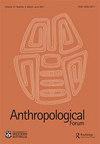Witness Statements as Cross-Cultural (mis)Communication? Evidence from Blue Mud Bay
IF 0.7
3区 社会学
Q3 ANTHROPOLOGY
引用次数: 0
Abstract
Translation, broadly defined as the articulation of the relationship between different cultural, social and legal systems, is at the heart of the anthropologist’s or linguist’s role as an expert witness in a native title hearing. It occurs at the level of individual lexemes, in categorising cultural concepts, and in the frame of the legal context. We exemplify the interrelationships between these by focussing on the quasi-legal use of the English word ‘permission’, a key concept in native title and land claim discourse. In the Blue Mud Bay case, Yolngu Matha was the first language of the witnesses, and there is no straightforward translation for this use of ‘permission’ in Yolngu Matha. As the ‘experts’ we needed to anticipate how Yolngu would understand the concept and its relevance to the court case. We first summarise our exploration of ‘permission’ with the claimants and show how a cross-cultural understanding of the ‘legal’ English concept emerged. We then focus on one of the court’s main artefacts of translation—the witness statement—which must be produced or be translated into English. In our experience the witness statement is a product of a dialogical process involving the close collaboration of applicant (witness), counsel and expert. We reflect on the complexity of this process and how it operated in the Blue Mud Bay case. We conclude that translation is both possible and necessary in the conduct of native title cases. But it is not straightforward, nor should it be an unexamined process.证人陈述作为跨文化(错误)交流?蓝泥湾的证据
翻译,广义上被定义为不同文化、社会和法律制度之间关系的表达,是人类学家或语言学家在土著title听证会上作为专家证人的核心角色。它发生在单个词汇的层面上,在对文化概念进行分类的层面上,以及在法律语境的框架中。我们通过关注英语单词“许可”的准法律使用来举例说明这些之间的相互关系,“许可”是土著所有权和土地主张话语中的一个关键概念。在蓝泥湾案中,Yolngu Matha是证人的第一语言,在Yolngu Matha中,“许可”一词的用法没有直接的翻译。作为“专家”,我们需要预测Yolngu将如何理解这个概念及其与法庭案件的相关性。我们首先总结了我们与索赔人对“许可”的探索,并展示了对“法律”英语概念的跨文化理解是如何出现的。然后,我们将重点关注法庭翻译的主要产物之一——证人陈述,它必须被制作或翻译成英文。根据我们的经验,证人陈述是涉及申请人(证人)、律师和专家密切合作的对话过程的产物。我们反思了这一过程的复杂性,以及它在蓝泥湾案中的运作方式。我们的结论是,在处理土著产权案件中,翻译既是可能的,也是必要的。但这不是直截了当的,也不应该是一个未经检验的过程。
本文章由计算机程序翻译,如有差异,请以英文原文为准。
求助全文
约1分钟内获得全文
求助全文
来源期刊

Anthropological Forum
ANTHROPOLOGY-
CiteScore
3.60
自引率
10.00%
发文量
14
期刊介绍:
Anthropological Forum is a journal of social anthropology and comparative sociology that was founded in 1963 and has a distinguished publication history. The journal provides a forum for both established and innovative approaches to anthropological research. A special section devoted to contributions on applied anthropology appears periodically. The editors are especially keen to publish new approaches based on ethnographic and theoretical work in the journal"s established areas of strength: Australian culture and society, Aboriginal Australia, Southeast Asia and the Pacific.
 求助内容:
求助内容: 应助结果提醒方式:
应助结果提醒方式:


